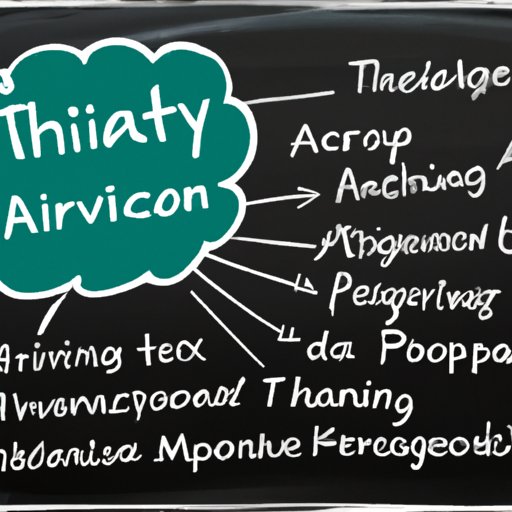
Introduction
Anxiety is a common issue experienced by many individuals. It is a feeling of unease, worry, or fear that can range from mildly uncomfortable to severe. Anxiety can be triggered by various factors, including stress, life changes, medical conditions, and more. It can affect every aspect of a person’s life, from their personal relationships to their work performance. Managing anxiety is crucial for overall well-being and quality of life.
6 Simple Relaxation Techniques to Ease Anxiety
Relaxation techniques are effective in reducing anxiety. Here are six simple relaxation techniques that you can try:
Deep Breathing
Deep breathing is a simple yet effective relaxation technique that can help ease anxiety. Find a comfortable position, either seated or laying down, and take a deep breath through your nose. Hold it for a few seconds and release the air slowly through your mouth. Focus on the sensation of your breath moving in and out of your body. Repeat this for a few minutes and notice how you feel.
Progressive Muscle Relaxation
Progressive muscle relaxation is a technique that involves tensing a group of muscles and then slowly releasing them. Start by clenching your fist and holding that tension for a few seconds, then relax your hand. Move to your biceps, triceps, and shoulders, progressively tensing and relaxing each muscle group. Repeat with other muscle groups like your legs and feet. This technique can reduce physical tension and promote relaxation.
Visualization
Visualization is a relaxation technique that involves visualizing a calming place in your mind. Close your eyes and imagine yourself in a peaceful, calming environment. Focus on the sights, sounds, and smells around you. Imagine how you feel in this serene space. As you visualize, breathe deeply and let go of any negative thoughts or feelings.
Other Relaxation Techniques
Other relaxation techniques that can help ease anxiety include listening to calming music, taking a warm bath, practicing yoga or tai chi, and practicing meditation. These techniques can help you calm your mind, reduce stress, and achieve deep relaxation.
Benefits of Relaxation Techniques
Relaxation techniques are beneficial for reducing anxiety. They can decrease your heart rate, lower your blood pressure, and decrease muscle tension. Incorporating these techniques into your daily routine can help you find calmness and achieve the relaxation you need.
The Power of Exercise in Reducing Anxiety
Exercise is known to have a powerful effect on mental health. It can reduce anxiety levels and improve mood. Exercise releases endorphins, the body’s natural feel-good chemicals that help reduce tension and stress.
Explanation of How Exercise Helps
Exercise can reduce symptoms of anxiety as it increases brain activity, which can release the body’s endorphins. It also promotes feelings of calmness and well-being and reduces physical tension. Exercise can help your body deal with stress and build up a tolerance to anxiety triggers.
Specific Exercises That Can Help
Any physical activity can help reduce anxiety. Brisk walking, jogging, dancing, cycling, or swimming are great ways to release endorphins and stimulate the body. Exercise that involves mindfulness, like yoga and tai chi, has added benefits as they combine exercise and relaxation techniques, which can improve mental health.
How Often to Exercise
Experts recommend that adults should aim to exercise at least 150 minutes per week. It is important to find a physical activity that you enjoy and can fit into your schedule. You can start small, like taking a 10-minute walk in the morning, and gradually increase the duration or intensity of your exercise routine.
Other Benefits of Exercise
Exercise also has other physical and mental health benefits. It can improve overall physical health, increase energy levels, control weight, and improve sleep quality. Exercise can also improve self-esteem and reduce symptoms of depression and anxiety.
How to Use Mindfulness to Reduce Anxiety
Mindfulness is the practice of paying attention to the present moment without judgment. It involves bringing your awareness to your thoughts, feelings, and bodily sensations, without trying to change or fix them. Practicing mindfulness can help reduce anxiety by promoting a sense of calmness and focus.
Explanation of Mindfulness
Mindfulness is the practice of becoming aware of present-moment experiences with curiosity, openness, and a willingness to be with what is. It involves paying attention to your thoughts and feelings, but not getting swept away by them. By practicing mindfulness, individuals can develop a sense of clarity and self-awareness, which can help them build resilience in the face of anxiety-inducing situations.
Strategies for Practicing Mindfulness
You can start practicing mindfulness by setting aside a few minutes each day to focus on your breath. Sit in a comfortable position and bring your attention to your breath. Notice the sensations in your body as you breathe in and out. Try to keep your focus on your breath, even if your mind wanders. Other mindfulness strategies include body scan meditation, mindful walking, and mindful eating.
Benefits of Mindfulness
Mindfulness can help reduce anxiety by promoting relaxation and focus. Practicing mindfulness can improve your ability to manage emotions, stress, and anxiety. It can also help improve overall well-being and quality of life.
The Benefits of Aromatherapy for Anxiety Relief
Aromatherapy is the use of essential oils for therapeutic purposes. Essential oils can be used to promote relaxation, reduce symptoms of stress, and improve mood. Aromatherapy has been found effective in reducing anxiety symptoms.
Explanation of Aromatherapy
Aromatherapy is the use of essential oils to promote relaxation and well-being. Essential oils are derived from plants, and they are highly concentrated substances that can be inhaled, applied topically, or added to bathwater. Essential oils can affect the limbic system, which is responsible for emotions, mood, and behavior, which is why they have been found to be effective in reducing anxiety symptoms.
Specific Essential Oils That Can Help
There are several essential oils that can help reduce anxiety symptoms. Lavender oil can promote relaxation and calmness. Bergamot oil can help reduce stress and anxiety. Chamomile oil has calming properties that can help with insomnia and anxiety symptoms. Ylang-ylang oil has a soothing and calming effect that can help reduce anxiety.
Different Methods for Using Essential Oils
Essential oils can be used in various ways to promote relaxation and reduce anxiety symptoms. They can be inhaled through a diffuser or added to bathwater. Topical application, like massage, is common as well. Essential oils can also be added to lotions, creams, and other body products.
Benefits of Aromatherapy
Aromatherapy can help promote relaxation, calmness, and improve emotional well-being. It is a non-invasive form of therapy that can easily be incorporated into your daily routine. Aromatherapy is also a great alternative to traditional medication for anxiety.
The Importance of a Healthy Diet in Reducing Anxiety
A healthy diet plays a crucial role in reducing anxiety symptoms. The food we eat affects our gut health, which in turn influences our brain and mental health.
Explanation of How Diet Affects Anxiety
The food you eat affects your gut health, which communicates with your brain via the gut-brain axis. Foods that are high in sugar or processed can cause inflammation in the gut, affecting the gut-brain axis, and leading to anxiety symptoms. A diet rich in nutrient-dense foods, like fruits, vegetables, and whole grains, can improve gut health and reduce anxiety symptoms.
Foods That Can Help
Foods that can help reduce anxiety symptoms include fatty fish like salmon, avocado, berries, nuts, and seeds. Dark chocolate is also recommended as it contains magnesium, which can improve mood and reduce anxiety.
Foods to Avoid
Foods to avoid if you’re struggling with anxiety include alcohol, caffeine, processed foods, and those high in sugar or refined carbohydrates. These can worsen anxiety symptoms by causing inflammation in the gut.
Benefits of Healthy Eating
A healthy diet not only improves physical health but also mental health. A healthy diet can decrease inflammation, improve gut health, and increase the production of neurotransmitters that regulate mood, all of which can reduce anxiety symptoms.

The Benefits of Therapy for Managing Anxiety
Therapy is a powerful tool for managing anxiety. It is a safe space to talk about your anxiety and work with a mental health professional to develop coping strategies.
Explanation of Different Types of Therapy
There are different types of therapy, including cognitive-behavioral therapy (CBT), psychotherapy, and exposure therapy. CBT is a form of therapy that focuses on changing negative thought patterns and behaviors that contribute to anxiety symptoms. Psychotherapy is a talk therapy that involves exploring emotions and experiences to gain insight into anxiety symptoms. Exposure therapy involves gradually exposing a person to anxiety-inducing situations to help them build tolerance and reduce fear.
Benefits of Speaking to a Mental Health Professional
Speaking to a mental health professional can provide you with a safe and non-judgmental space to talk about your anxiety. A mental health professional can help you develop coping strategies, work through negative thoughts, and provide tools for managing anxiety.
How to Find a Therapist
If you are interested in finding a mental health professional to speak to, you can ask for referrals from your primary care physician, check with your insurance provider, or search for therapists in your area online. It is important to find a therapist that you feel comfortable with and that understands your needs.
Conclusion
Anxiety can be managed through various strategies, including relaxation techniques, exercise, mindfulness, aromatherapy, healthy eating, and therapy. These strategies can help reduce anxiety symptoms and improve overall well-being. It is important to try different strategies and find what works best for you. If anxiety is impacting your daily life, it is also essential to seek professional help from a mental health professional.




